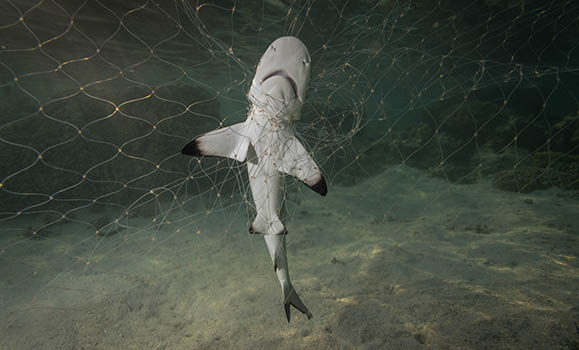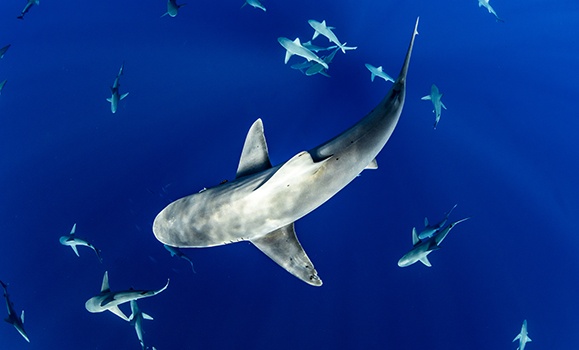Over the last few decades, hundreds of millions of sharks have been killed for a single, yet lucrative piece of their anatomy.
Their fins ŌĆö one of the apex predator's distinct features ŌĆö have long been a coveted commodity in parts of Asia, where shark-fin soup has become a status symbol that can run upwards of $200 for a bowl of the tasteless, gelatinous broth that many believe has medicinal benefits despite an absence of scientific proof.
The hunt for the appendage, however, resulted in a cruel practice known as shark finning, which involves slicing off the animal's fin often while it is still alive and then tossing the body overboard where it dies by suffocation, blood loss or predation by other marine life.
Increased awareness of the practice over the last two decades prompted governments around the world to introduce a host of regulations aimed at reducing mortality rates and species extinction risks linked to both fishing and finning.
But until now, it has not been clear whether those protective legislative measures have been effective in slowing the loss of sharks overall, since they have not been assessed at a global scale.
Tracking the fate of sharks
An international team of researchers has done a ground-breaking global study to better understand trends in shark mortality across 150 fishing countries, territories, and the high seas. They examined shark catches from 2012 to 2019, after many new regulations were implemented, to see whether the measures had effectively reduced species loss.
They also conducted in-depth interviews with shark fishery experts from around the world to better contextualize current trends in shark finning and fishing practices. Their dataset tracked the fates of an estimated 1.1 billion sharks caught by fisheries.
Their in Science.
 The team, led by Boris Worm (shown right) of Dalhousie University and Darcy Bradley at the University of California and The Nature Conservancy, found that total fishing mortality for all species of sharks actually increased to 80 million from 76 million sharks in that period, with roughly 25 million of those being threatened species.
The team, led by Boris Worm (shown right) of Dalhousie University and Darcy Bradley at the University of California and The Nature Conservancy, found that total fishing mortality for all species of sharks actually increased to 80 million from 76 million sharks in that period, with roughly 25 million of those being threatened species.
When also accounting for sharks not properly identified by species, the global mortality estimate rose to 101 million sharks in 2019.
"By linking fishing mortality data to the global regulatory landscape, we show that widespread legislation designed to prevent shark finning did not reduce mortality overall, but regional shark fishing or retention bans had some success," says Dr. Worm, a research professor in the Department of Biology.
"Too many sharks are dying and this is especially worrisome for threatened species, such as hammerhead sharks."
Recommended reading:╠²Shark necropsy offers Dal students rare chance to learn about endangered creature up close
Amid increase, a need for momentum
The increase came primarily from coastal fisheries. These activities account for 95 per cent of total shark fishing mortality globally in terms of number of individual sharks caught and killed. Shark mortality in these fisheries increased by four per cent between 2012 and 2019. This contrasted with regulated open-ocean fisheries, especially across the Atlantic and western Pacific, where shark mortality decreased by an estimated seven per cent.
The team also analyzed the relationship between shark catches and shark fishing regulations by country, finding that shark fishing prohibitions and accountable governance were the only measures associated with reduced mortality.
ŌĆ£The unsustainable fishing of sharks is an unsolved global problem that could eventually lead to the extinction of some of our planetŌĆÖs most ancient and revered species,ŌĆØ said Dr. Bradley. ŌĆ£We found that despite myriad regulations intended to curb shark overfishing, the total number of sharks being killed by fisheries each year is not decreasing. If anything, itŌĆÖs slightly increasing.ŌĆØ

Blacktip reef shark entangled inc oastal gillnet. (OceanImageBank/Tom Vierus)
Nearly 70 per cent of maritime jurisdictions around the world have introduced some regulatory measures to eliminate shark finning and associated fishing mortality, little of which existed 20 years ago.
"The amazing thing is that itŌĆÖs not just one or two countries, but that many governments and some of the worldŌĆÖs biggest fishing companies have committed to eliminating finning, often in response to public pressure. The challenge now is to build on this momentum and get stronger measures in place to reduce shark catches overall," said co-author Laurenne Schiller, a post-doctoral fellow at both Dalhousie and Carleton University in Ottawa.
While the researchers found that finning prohibitions likely reduced shark finning at sea, these regulations had little effect on mortality overall. In fact, they may have even increased catches, possibly by incentivising the full use of sharks and creating additional markets for shark meat and other products.
Co-author Leonardo Feitosa, a shark biologist from Brazil now working at UC Santa Barbara, explained: "We have seen the demand for shark fins decreasing and the demand for shark meat increasing, with Brazil and Italy being the main consumers. Because shark meat is a relatively cheap substitute for other types of fish, there is considerable mislabeling, making some consumers eat shark meat without their knowledge."
Recommended reading:╠²Dal scientists dive into shark research and conservation
Expanding efforts
The authors conclude that shark fishing continues to present a substantial threat to shark populations, but that proven solutions are working where they are applied. ŌĆ£ItŌĆÖs clear from our analysis that cracking down on shark finning is not enough,ŌĆØ said Echelle Burns, a data scientist at UC Santa Barbara. ŌĆ£More specific measures that address shark mortality ŌĆö like prohibiting fishing in certain areas or requiring fishers to release vulnerable species that they accidentally caught ŌĆö can help protect more sharks."
Co-author Nidhi DŌĆÖCosta, a shark researcher from Bangladesh now working at Dalhousie, says effective conservation actions for sharks are often impeded by a lack of community-based awareness and stewardship projects.
"This is especially crucial in countries where small-scale artisanal fisheries are a major driver of shark mortality."
The authors recommend combining area-based protections with fishing regulations to improve the outlook for sharks. New policies need to specifically discourage the retention of overfished and threatened species and help reduce shark bycatch. They also stress the importance of accountability of fleets, fishing companies and management bodies to support the successful implementation of these measures.
"Complete bans on shark fishing, through protective measures such as shark sanctuaries can be successful, highlighting an opportunity to prioritize these and other area-based conservation measures," explained Bradley.
Recommended reading:╠²DalŌĆÖs university veterinarian was on a routine dive near Halifax. Then a great white shark spotted him.

